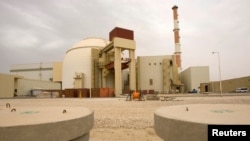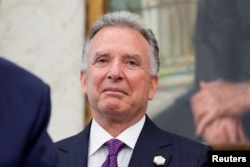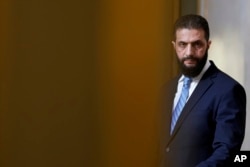
Welcome back to the Farda Briefing, an RFE/RL newsletter that tracks the key issues in Iran and explains why they matter.
I'm RFE/RL correspondent Kian Sharifi. In this edition, I'm looking at how Tehran and Washington are digging in on the core nuclear issue: enrichment. The United States insists Iran can’t enrich uranium; Iran maintains it won’t give it up. With both sides refusing to budge, the standoff is heating up.
What You Need To Know
• Nuclear Talks Head To Rome: After weeks of escalating rhetoric, Iran and the United States have agreed to resume nuclear talks in Rome, but both sides remain entrenched on core issues -- especially uranium enrichment. The US demands a total halt to enrichment, while Iran insists it will continue “with or without a deal.” The talks come amid reports that Israel is preparing for possible military action if diplomacy fails.
• Iran Hangs Azerbaijan Embassy Attacker: Iran executed Yasin Hosseinzadeh on May 21 for the deadly armed attack on the Azerbaijani Embassy in Tehran in January 2023, which killed the embassy’s head of security and wounded two others. Iranian authorities said Hosseinzadeh acted out of personal motives, while Azerbaijan called the incident a “terrorist act.” The execution comes amid efforts to improve Iran-Azerbaijan relations, with both countries recently emphasizing the importance of cooperation and diplomatic security
• UK-Iran Tensions Soar Over Alleged Spy Plot: Tensions between the United Kingdom and Iran escalated after British authorities charged three London-based Iranian men with assisting Iran’s intelligence service and targeting journalists linked to Iran International, a broadcaster critical of Tehran. The men, arrested earlier this month, allegedly conducted surveillance from August 2024 to February 2025. Both countries summoned each other's diplomats in protest this week. The UK cited national security concerns, while Iran called the arrests politically motivated.
The Big Issue
All Roads Lead To Rome
Following nearly two weeks of heightened tensions and diplomatic brinkmanship, Iran and the United States will resume nuclear negotiations in Rome on May 23.
Despite agreeing to meet, both sides are holding firm on their demands. The United States, under President Donald Trump, insists Iran must halt all uranium enrichment, calling it essential to prevent weaponization.
Iranian Supreme Leader Ayatollah Ali Khamenei has dismissed these demands as “outrageous,” and Foreign Minister Abbas Araqchi has vowed that enrichment will continue regardless of the outcome of the talks.
The stakes are heightened by reports that Israel is actively preparing for a possible strike on Iranian nuclear facilities if diplomacy fails.
Meanwhile, European powers are threatening to reimpose UN sanctions unless a deal is reached soon, adding further pressure on Tehran.
Domestic politics in both Washington and Tehran complicate compromise, with hard-liners on both sides urging their leaders not to back down.
Why It Matters: The outcome of the Rome talks could reshape the security landscape of the Middle East.
A diplomatic breakthrough might avert a military confrontation and restore limits on Iran’s nuclear program, while failure could trigger Israeli military action and the return of crippling UN sanctions.
The stakes are not only regional -- global oil markets and nonproliferation norms all hang in the balance.
What's Being Said: Khamenei has voiced deep skepticism about the prospects for progress, telling Iranians, “I do not think nuclear talks with America will bring results. I do not know what will happen.”
Before leaving Tehran for Rome on May 23, Araqchi wrote on X that “figuring out the path to a deal is not rocket science,” adding that an agreement is possible if the goal is to ensure Iran won’t acquire nuclear weapons -- but impossible if the aim is to dismantle enrichment capabilities.
On the American side, US Special Envoy Steve Witkoff underscored Washington’s hard line, stating: “Enrichment enables weaponization.”
Secretary of State Marco Rubio reinforced this position before the US Senate, declaring, “Any level of domestic enrichment is unacceptable and poses a direct threat,” signaling that the Washington is unlikely to soften its stance.
Expert Opinion: Robert Einhorn, a former special adviser to the US State Department on nonproliferation, told RFE/RL’s Radio Farda that congressional Republicans “have been inclined to support the policies of Trump.”
He added that “any respectable deal negotiated” by the US president would also likely have Democratic support -- especially if it’s seen as tough and enforceable.
That's all from me for now.
Until next time,
Kian Sharifi
If you enjoyed this briefing and don't want to miss the next edition, subscribe here . It will be sent to your inbox every Friday.


